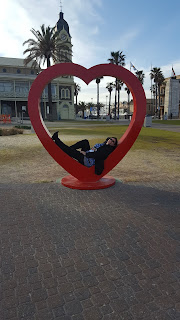There is a rumour that writing and depression go together. In
fact some documents I have read state it is a fact. Is it any wonder? Writing
is an isolated profession. You are alone in a room with a computer and
imaginary characters for endless hours, sometimes going without exercise,
direct sunlight, enough sleep. Not to mention the ever-present pressure of the
deadline looming forebodingly in the back of your mind.
But I'm
not talking about depression while writing. That is a whole other subject. I'm
talking about post-manuscript depression... When your precious manuscript has
left you and is in the hands of others... the publishers. Does anyone else out
there worry will it be good enough? Could I have done more? I do. It
seems hard to let go of the baby I've been working on for so long, yet at the
same time, I know if I had to read through those pages one more time it could
be detrimental to myself and anyone around me.
I have
just finished my third "Lexie Rogers" novel, Fatal Mistake,
and I have to say I found this book harder than the others. Or maybe my memory
is fading... Wanting to make it better than the last, I devised a complicated
plot that speared off in many different directions to eventually come back together. Well that was the plan, and
after many hours re-plotting, tweaking and slowly going crazy, thankfully that's
what happened. Since Fatal Mistake is the third in a series I also had to keep
revising my first two books to ensure continuity of characters and storyline. For
example, I thought I'd killed off someone's father in the second book but was
not sure so I had to read it again and discovered that I didn't. This happened
many times - even though I took notes - which was time consuming and draining.
I
found that deadline drawing closer with too much left to do so, after a mild
panic, I did what I had to do and locked myself in my study, hardly left the
house, did no exercise and hardly spoke to anyone other than those who live with
me. I lived on frozen dinners and did
minimal housework - everything I
promised myself I would not do - until it was finished. What choice did I have?
No one could write the book for me...
Then,
to my surprise, when the manuscript was sent off I felt flat. Which was not at
all what I had expected. Now what was I going to do? I thought. What was my purpose?
I could start another manuscript but I knew I needed a break. So I made a list...
On my list were things I could now do since my work was done. Firstly, I would not feel guilty for having time out. I could relax... spring clean...go for long walks... and catch up with much neglected friends and family. So that's what I'm doing, although it does feel weird. However, ticking off items on a list gives me a sense of accomplishment. I intend to enjoy my down time because before I know it the first edits will be upon me and it will be back to the computer.
What do
you like to do, or how do you reward yourself once your hard work is done and
the manuscript you are working on is complete?
I love to learn... about social media because I am sadly lacking.



























